Stress is an inevitable part of the human experience. Everyone experiences stress in their lives, whether that be relationship stress, professional stress, academic stress, or even the everyday stresses of simply trying to keep up with responsibilities.
While short bursts of stress can sometimes be motivating, ongoing stress can have a profound effect on the body. It can disrupt sleep, impact mood, and even throw our hormones off balance. Interestingly, the way stress influences hormones can look different in women compared to men. In this blog, we’ll explore how stress affects hormonal health, with a closer look at women’s experiences.
What happens to our body during stress?
Stress can affect all systems of our body, including the musculoskeletal, respiratory, cardiovascular, endocrine, gastrointestinal, nervous, and reproductive systems. Since the focus of this blog is the influence of stress on hormones, we will take a closer look at how stress impacts the endocrine system, particularly in women.
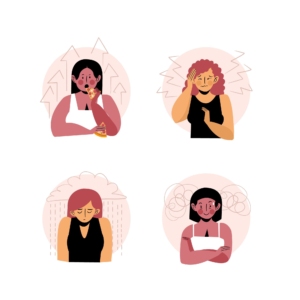
The endocrine system is essentially a network of glands that secretes hormones into the bloodstream. Therefore, when we encounter stress, whether that be in a professional setting, or even personal, our brain triggers a chain reaction. The reaction involves the hypothalamic- pituitary-adrenal (HPA) axis, a system that controls how our body responds to stress.
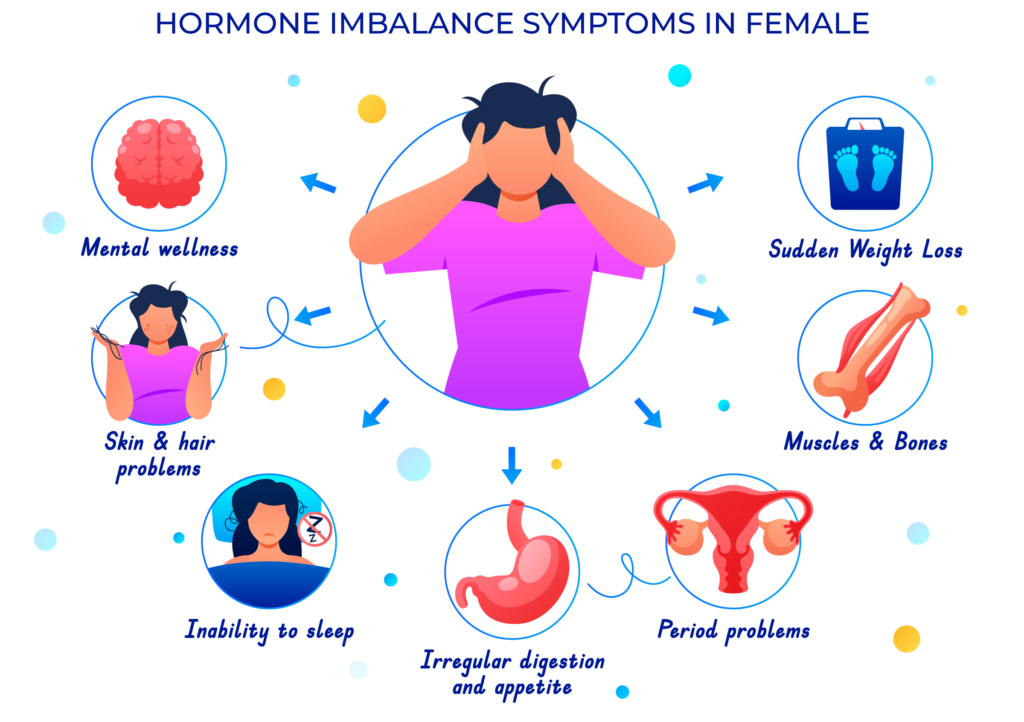
The HPA axis signals the adrenal glands to release glucocorticoids, which includes cortisol. Cortisol is also known as the “stress hormone” because it plays a critical role in helping the body cope with stress (American Psychological Association).
Stress and its impact on female hormones
But how exactly does stress affect hormones in women?
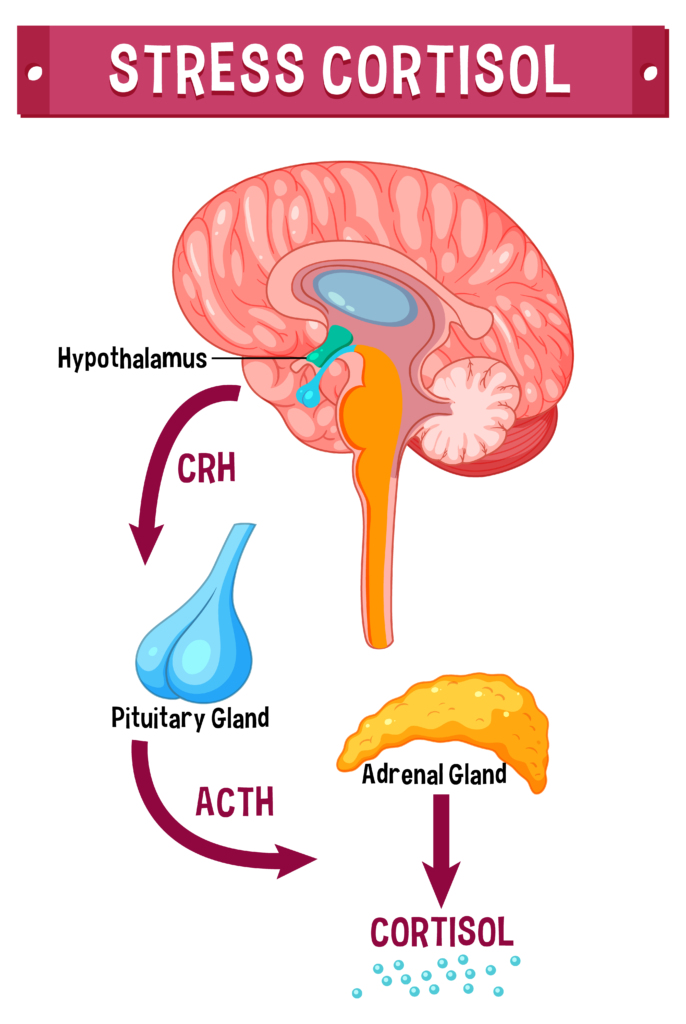
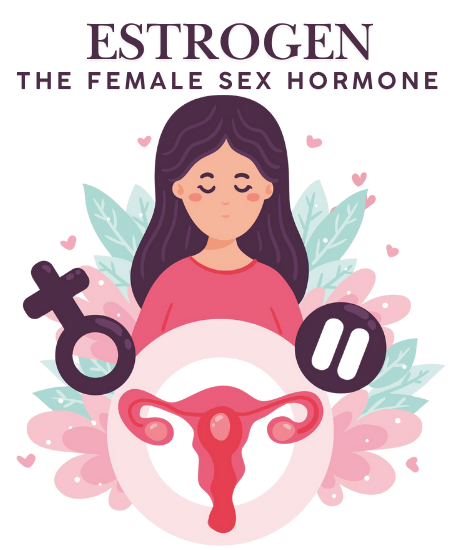
Estrogen, one of the main female sex hormones, can help calm the body’s stress response by controlling how much cortisol, the primary stress hormone, is active (Kajantie, 2008). When estrogen levels are higher, the HPA axis, our stress-control system, slows down a bit, making the body less reactive to stress.
That’s why many women notice they feel more emotionally balanced around days 12–14 of their menstrual cycle, which is when estrogen peaks and your body is naturally better equipped to handle stress.
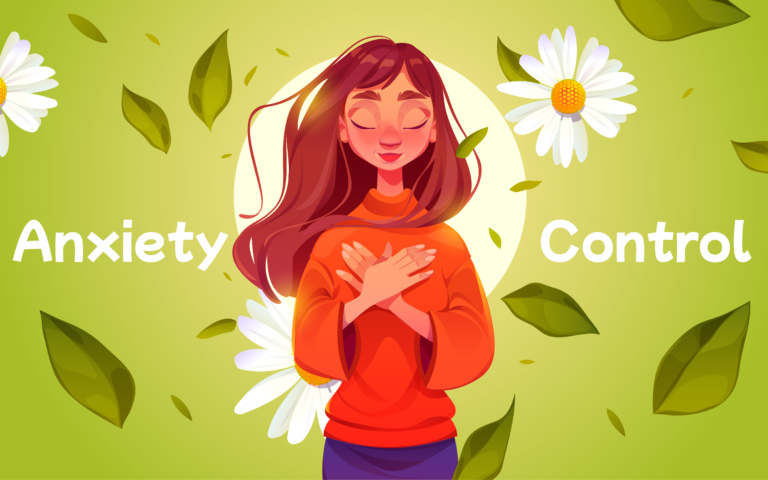
Long-Term Effects of Chronic Stress on Women’s Hormones
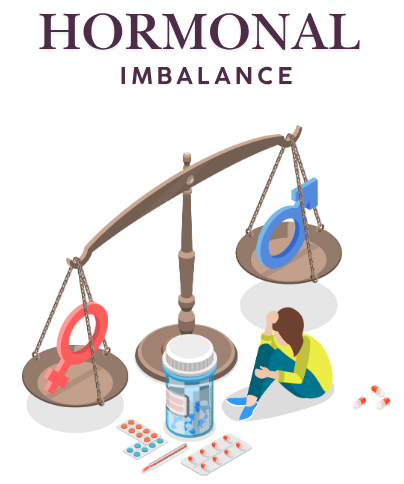
Chronic stress can disrupt hormonal harmony, affecting everything from ovulation to overall reproductive wellbeing. A study conducted by Phelan and colleagues (2021) investigated the impact of COVID-19, a period of extensive stress and psychological distress, on women’s reproductive health.
Additionally, the study also reported that women experienced more severe premenstrual syndrome (PMS) symptoms, which are often triggered by high levels of psychosocial stress. PMS can further affect women’s health, as it is associated with anxiety, postnatal depression, and perimenopausal depression (Phelan et al., 2021).
Stress can also directly affect fertility. By influencing the adrenal glands and hormone release, stress can interfere with ovulation, fertilization, and implantation, all crucial steps for a successful pregnancy (Palomba et al., 2018). Additionally, in women overall, stress was found to decrease fertility outcomes.
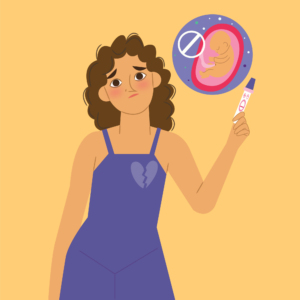

In animal studies, it was found that stress can cause the uterus to become less receptive to an embryo, even in cases where hormonal treatment is being used to support fertility (Palomba et al., 2018).
Lastly, stress is often correlated with factors like depression, avoidance, and high emotional expression, which can all negatively impact fertility. Overall, stress affects both our hormonal balance and reproductive health. Managing stress is therefore essential, not just for our mental wellbeing, but for our overall health.
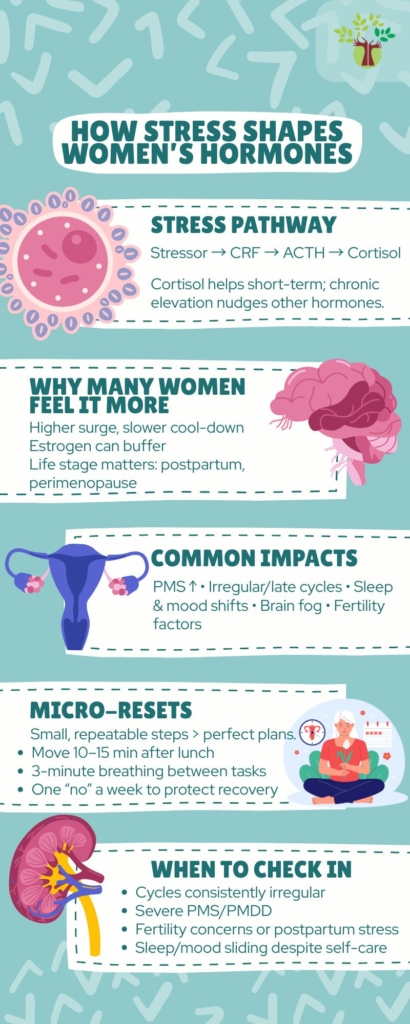
Stress Relief Strategies
As stress can take a serious toll on both our body and mind, it’s important to take steps to manage it whenever possible. Here are a few simple and effective tips recommended by the Mayo Clinic to help relieve stress:
- Engage in physical activity → Exercise can help increase our “feel good” hormones which can boost our sense of well-being
- Practice meditation → Mediation such as mindfulness can give us a sense of calm amongst the chaos which can enhance both our physical and emotional well-being
- Getting enough sleep → Stress can lead to sleepless nights, however sleep is how our mind and body recharge. Thus, sleep can affect our overall functioning.
- Seek counselling → If it feels too much, you’re not alone. Talking to a trained professional can help you process your emotions, develop coping strategies, and find relief. There’s always help available.
When stress shapes your hormones, you can shape your next step.
References
12 tips to tame stress. (n.d.). Mayo Clinic. https://www.mayoclinic.org/healthy-lifestyle/stress-management/in-depth/stress-relievers/art-20047257
American Psychological Association. (n.d.). American Psychological Association. https://www.apa.org/topics/stress/body
Kajantie, E. (2008). Physiological stress response, estrogen, and the Male–Female mortality gap. Current Directions in Psychological Science, 17(5), 348–352. https://doi.org/10.1111/j.1467-8721.2008.00604.x
Kokras, N., Hodes, G. E., Bangasser, D. A., & Dalla, C. (2019). Sex differences in the hypothalamic–pituitary–adrenal axis: An obstacle to antidepressant drug development? British Journal of Pharmacology, 176(21), 4090–4106. https://doi.org/10.1111/bph.14710
Palomba, S., Daolio, J., Romeo, S., Battaglia, F. A., Marci, R., & La Sala, G. B. (2018). Lifestyle and fertility: the influence of stress and quality of life on female fertility. Reproductive Biology and Endocrinology, 16(1). https://doi.org/10.1186/s12958-018-0434-y
Phelan, N., Behan, L. A., & Owens, L. (2021). The impact of the COVID-19 pandemic on women’s reproductive health. Frontiers in Endocrinology, 12. https://doi.org/10.3389/fendo.2021.642755

